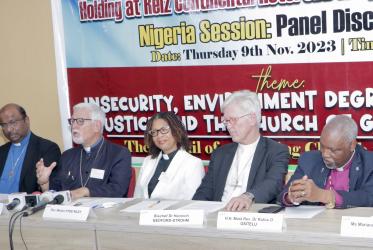-
The United Nations established a Peacebuilding Commission in December 2005, as an intergovernmental advisory body to help countries in post-conflict peace building recovery, reconstruction and development. On 11th October 2006, the Commission took a major step forward when a Peacebuilding fund with a target of US$250 million was launched at the United Nations headquarter.
-
The establishment of the Fund represents a major step forward in the United Nations Peacebuilding efforts and reflects a commitment by the international community to undertake sustained engagement in countries emerging from conflicts. The then Secretary General of the United Nations, Kofi Annan, at the launching of the Fund said: "the international community now has at its disposal a new and well designed Peacebuilding platform. Used well, it can help countries avoid a relapse into conflict, and enable them to regain - or find for the first time - the path to peace".
-
The Peacebuilding Commission is designed to support post-conflict stabilisation initiatives, such as implementation of peace agreements and prevention of the recurrence of conflict. It will also help better co-ordination of various capacities and expertise, as well as benefit by all the UN experience on such matters as conflict prevention, mediation, peacekeeping, respect for human rights, the rule of law, humanitarian assistance, reconstruction and long term development. Specifically, the Commission will: a) propose integrated strategies for post conflict Peacebuilding and recovery; b) help to ensure predictable financing for early recovery; c) extend the period of attention by the international community to post conflict recovery; d) develop best practices on issues that require extensive collaboration among political, military and humanitarian development actors.
-
The World Council of Churches has a longstanding commitment to peace and reconciliation, and to heal broken communities in order to build a culture of peace. The WCC Central Committee meeting in Geneva, 26th August to 3 September 1999, in its message - The Decade to Overcome Violence (DOV), Churches seeking Reconciliation and Peace - stated:
"We offer with the Decade to Overcome Violence a truly ecumenical space, a safe space for encounter, mutual recognition, and common action. We will strive together to overcome the spirit, logic and practice of violence. We will work together to be agents of reconciliation and peace with justice in homes, churches and communities as well as in political, social and economic structures at national, international levels. We will co-operate to build a culture of peace that is based on just and sustainable communities".
The Central Committee's message coincided with the United Nations "Decade for Culture of Peace and non Violence for the Children of the World". The two initiatives were meant to motivate and strengthen each other.
-
The World Council of Churches and its members have witnessed the trauma of people in post-conflict situations and have accompanied and supported suffering communities in these and other situations. It was in light of these experiences that the statement on UN Reform issued at the 9th General Assembly 14-23 February 2007, Porto Alegre, Brazil:
-
"Welcomed the establishment of the Peacebuilding Commission as a means of developing new and appropriate ways of responding to civil conflict. The Peacebuilding Commission should adopt and endorse Peacebuilding principles and practices, which emphasise local ownership in Peacebuilding and peacekeeping processes. These should also promote the full participation of women (in accordance with the UN Security Council Resolution 1325). At the same time current disarmament forums and mechanism must be strengthened and made more effective".
The Executive Committee of the World Council of Churches Meeting in Geneva, 27th February to 2nd March 2006:
-
recognises the contribution made by the United Nations, over the years, in Peacebuilding and peacekeeping activities in different regions of the world and expresses the need to preserve and build on these achievements by evaluating the existing approaches instruments and mechanism, including the organs of the UN system;
-
appreciates the establishment of the Peacebuilding Commission that will mobilise and channel resources at the disposal of the international community to advise and propose integrated strategies for post-conflict recovery, focussing attention on reconstruction, institution building and sustainable development in countries emerging from conflicts;
-
emphasises the importance of participation of regional and local actors, and stresses the importance of adopting flexible working methods to ensure the active participation of those affected by the conflict in the deliberations of the Commission;
-
reiterates the need to recognise the role and contribution of the churches and civil society organisation, engaged in peace building activities;
-
urges member churches to encourage and support the efforts of the Peacebuilding Commission, in post-conflict situations, in strengthening the links between peace and security, democracy and good governance;
-
calls on member states to provide full moral, material and human resources backing and support to ensure the successful functioning of the Peacebuilding Commission




